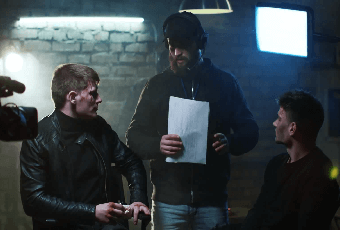Online Film School Free » Film Directing Course » Film directing – Do You Have What It Takes to Be a Film Director?
What Does It Mean to Direct a Movie?
Table of Contents
Toggle
Learning how to direct a film is a kind of fun stuff, but many responsibilities are coming with it. Eventually, you are going to be in charge on lot of money, work long hours without noticing it, and wanting to change the world with your art.so let see first if you have what it takes to become a film director. Each idea for a film will drag you into a new world you are going to emotionally invest in.
Finding a subject for a movie
finding a subject to do a movie is not as easy as it sounds. A subject for a film needs to be first of all something you’ll be ready to have an emotional investment in and that you are willing to start learning and do a deep search on. In the article about Finding an Idea, I give some good tips for finding an idea you can run with.
Know The Filmmaking Craft
Before you start directing a film, make sure you know the film directing fundamentals and film directing techniques. It’s basic knowledge that the purpose of film directing is to tell a story with pictures and sounds, but the truth is that in film directing, the story is being also told through:
- actors
- art design
- clothes design
- dialog styles, and more
The director is in charge of all of that. That’s why the director must know all the filmmaking departments, and we try to cover them all. If you look at the most respectable directors, you’ll see that many of them have a gift, at least in one of these departments. Find yours and develop it.
Visualizing Abilities
In the article The film director’s vision, I talk about how to translate the script into visual shots and concepts that are unique to you, and in this film direction course online, we are talking about the tools that help you do just that. Tools like storyboard and shooting script, but the bottom line is: While you are visualizing your movie (which is the primary job of the film director), you’ll need to do it through the departments mentioned above.
Film As Many Short Films As You Can
Like everything else in life, film directing is all about practice. Shoot as much as you can and offer yourself to participate in as many productions as you can. Shooting many shorts helps to get your most profound artistic voices, out of the system until you’ll find the one that works best for you. You have to be ready to deal with the fact that most of your first shorts will probably suck, that’s OK. You can learn film directing only by making mistakes.

Find Your True Voice
As a film director and an artist, you have to find your inner voice, which separates you from all the others. You’ll have to be real honest with yourself and listen to it very well. I recommend reading my article, Find your inner voice, to learn better how to do that. Understanding your authentic voice is not enough. You also have to keep it as your guide through all the trips. That means to watch out from what other people say, but also to watch out for yourself. Don’t try to show how smart and artistic you are and focus entirely on what the movie needs.
Become a Leader
The difference between film directing and other arts like poetry or a painter is that the film directors have to lead a big crew after him. You’ll have to be good with people and also know how to push them to their limits so that you can take out the best from each one of them. You’ll need to be able to guide them, inspire them, and supervised them all at once. You’ll have to make decisions that sometimes are against the view of your crew. You have to lead with confidence. There is nothing worse for actors and crew member than to follow a director that is unsure of his actions. If you don’t know what to do in certain situations, don’t be afraid to console with the right crew members and make a confident decision. Sometimes the producers try to change things in your script to lower the expenses. Unless you agree with their changes, it’s your job to defend the script. With all of that, you’ll have to remember that you are working with artists, and an open mind is needed too.
Final thoughts
There are many requirements that are needed from a director – Imagination, knowledge of all film directing techniques, understanding people and how to work with them, the ability to make hard choices, and more, but the most important attribute that is needed from every director is to be able to have (and deliver) a clear vision about how the film needs to look.
Back to film direction course online page



